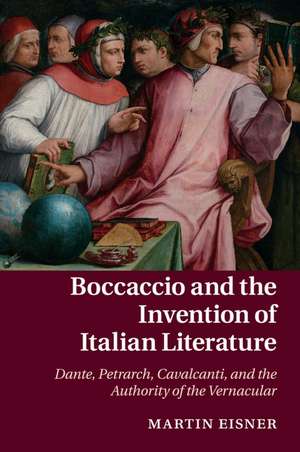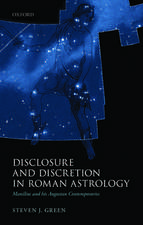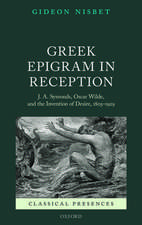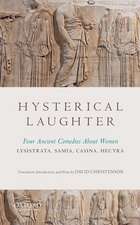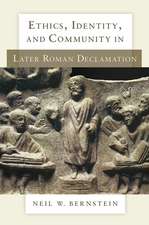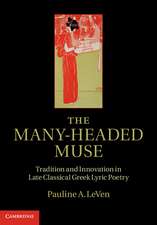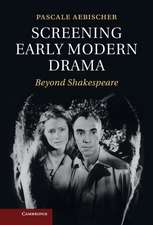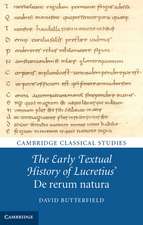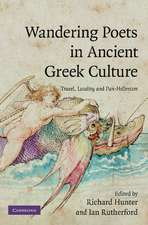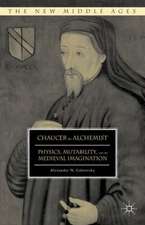Boccaccio and the Invention of Italian Literature: Dante, Petrarch, Cavalcanti, and the Authority of the Vernacular: Cambridge Studies in Medieval Literature, cartea 87
Autor Martin Eisneren Limba Engleză Paperback – 31 aug 2016
Din seria Cambridge Studies in Medieval Literature
-
 Preț: 269.83 lei
Preț: 269.83 lei -
 Preț: 237.74 lei
Preț: 237.74 lei -
 Preț: 283.25 lei
Preț: 283.25 lei -
 Preț: 281.49 lei
Preț: 281.49 lei -
 Preț: 237.34 lei
Preț: 237.34 lei -
 Preț: 285.54 lei
Preț: 285.54 lei -
 Preț: 287.86 lei
Preț: 287.86 lei - 14%
 Preț: 695.69 lei
Preț: 695.69 lei - 8%
 Preț: 404.47 lei
Preț: 404.47 lei -
 Preț: 282.87 lei
Preț: 282.87 lei -
 Preț: 204.05 lei
Preț: 204.05 lei -
 Preț: 285.37 lei
Preț: 285.37 lei - 11%
 Preț: 587.15 lei
Preț: 587.15 lei -
 Preț: 207.35 lei
Preț: 207.35 lei - 11%
 Preț: 697.28 lei
Preț: 697.28 lei - 11%
 Preț: 639.78 lei
Preț: 639.78 lei -
 Preț: 177.58 lei
Preț: 177.58 lei - 11%
 Preț: 637.36 lei
Preț: 637.36 lei - 11%
 Preț: 637.89 lei
Preț: 637.89 lei -
 Preț: 496.50 lei
Preț: 496.50 lei -
 Preț: 324.62 lei
Preț: 324.62 lei -
 Preț: 282.48 lei
Preț: 282.48 lei -
 Preț: 284.17 lei
Preț: 284.17 lei -
 Preț: 206.57 lei
Preț: 206.57 lei -
 Preț: 337.25 lei
Preț: 337.25 lei -
 Preț: 196.25 lei
Preț: 196.25 lei -
 Preț: 306.68 lei
Preț: 306.68 lei -
 Preț: 230.23 lei
Preț: 230.23 lei -
 Preț: 209.44 lei
Preț: 209.44 lei - 11%
 Preț: 585.10 lei
Preț: 585.10 lei - 11%
 Preț: 583.02 lei
Preț: 583.02 lei -
 Preț: 306.21 lei
Preț: 306.21 lei - 11%
 Preț: 639.58 lei
Preț: 639.58 lei - 11%
 Preț: 642.35 lei
Preț: 642.35 lei
Preț: 283.63 lei
Nou
Puncte Express: 425
Preț estimativ în valută:
54.29€ • 58.99$ • 45.63£
54.29€ • 58.99$ • 45.63£
Carte tipărită la comandă
Livrare economică 21 aprilie-05 mai
Preluare comenzi: 021 569.72.76
Specificații
ISBN-13: 9781316619698
ISBN-10: 1316619699
Pagini: 262
Ilustrații: 7 b/w illus. 4 tables
Dimensiuni: 153 x 230 x 15 mm
Greutate: 0.35 kg
Editura: Cambridge University Press
Colecția Cambridge University Press
Seria Cambridge Studies in Medieval Literature
Locul publicării:Cambridge, United Kingdom
ISBN-10: 1316619699
Pagini: 262
Ilustrații: 7 b/w illus. 4 tables
Dimensiuni: 153 x 230 x 15 mm
Greutate: 0.35 kg
Editura: Cambridge University Press
Colecția Cambridge University Press
Seria Cambridge Studies in Medieval Literature
Locul publicării:Cambridge, United Kingdom
Cuprins
Introduction: Boccaccio between Dante and Petrarch: cultivating vernacular literary community in the Chigi codex; 1. Dante's dirty feet and the limping republic: Boccaccio's defense of literature in the Vita di Dante; 2. Dante's shame and Boccaccio's paratextual praise: editing the Vita nuova, Commedia, and canzoni distese; 3. The making of Petrarch's vernacular Book of Fragments (Fragmentorum liber); 4. The inventive scribe: glossing Cavalcanti in the Chigi and Decameron 6.9; Epilogue: the allegory of the vernacular: Boccaccio's Esposizioni and Petrarch's Griselda.
Recenzii
'Eisner's book is a welcome addition to studies on the self‐authorizing project of the Italian poets at a key moment in the rise of European vernaculars. It is also a particularly fine specimen of the 'material' turn in medieval literary studies. A reliable guide to this intricate web of interconnectedness, Eisner shows how productive the combination of philology and interpretation can be, tracing convincingly the impact of paleographical features on reception, the significance of making a book, the significance of page layout, of juxtaposition, of inclusion and exclusion, of editorial choices, of contamination in transcription - and Boccaccio's unique role in all of this.' Alison Cornish, Modern Philology
Notă biografică
Descriere
This book examines Boccaccio's pivotal role in legitimizing the vernacular literature of Dante, Petrarch and Cavalcanti through argument, narrative and transcription.
